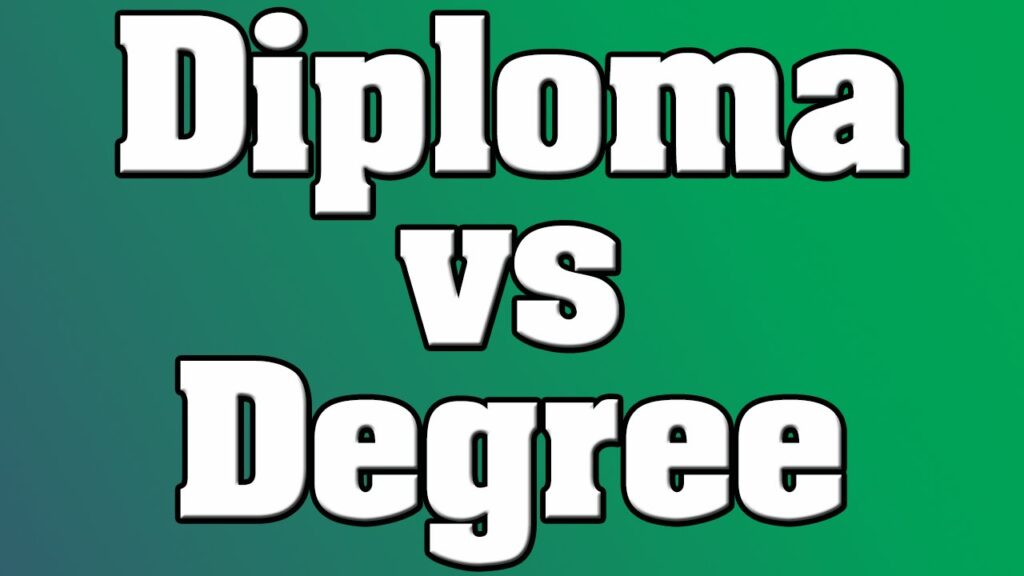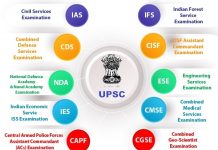Still Confuse on Difference Between Diploma and Degree . get Your Solution For this Confusing Question Here on best Colleges in India.

Definition of Degree

A certificate given to the student by the known university or college for the successful accomplishment of his/her studies in a stream at a specific level is known as Degree. The student can follow the degree courses afterward passing the higher secondary examination. The degrees are granted to the students in the convocation ceremony, organized by the university or college. There are four major degrees are:
- Associate Degree
- Bachelor Degree
- Master Degree
- Doctorate Degree
The student acquires an in-depth knowledge of the particular stream selected by him/her. The period of a degree program differs from 3 to 4 years. Correspondingly the theoretical knowledge, the student has to go for an internship having a duration of 3-6 months. The important benefit in following a degree course is that the students get jobs effortlessly in a short span of time. The prospectus of the degree course mainly focuses on the concentrating in chosen by the student. Some instances of Degree Courses are B. Com, B.Sc, MBA, B.E., B. Tech, B.A. M.E., M. Tech. etc.
Definition of Diploma
A certificate given to the student by a known university or an educational institution, for the sucessful completion of a course of study, is known as Diploma. The admission to diploma course can be occupied after clearing high school examination. There are two major diploma, namely:
- Graduate Diploma
- Post Graduate Diploma
While following a diploma course, he/she gets a full knowledge of the particular course opted by him/her. The period of the course can differ from 1 to 2 years. The main benefit of pursuing a diploma course is that it takes less time and money. Furthermore, the curriculum of a diploma course is framed in such a method that the students get added practical knowledge on the particular course. In this way, the skills are industrialized in them routinely. Some instances of Diploma courses are DCA, PGDCA, PGUDPL, PDGM, etc.
Difference between diploma and degree.
- The degree is a certificate given to the student by the university for the successful completion of his/her studies, up to a specific stage in a stream selected by him/her. The diploma is a certificate, given to the student by the educational institution for following and accomplishing a specific course successfully.
- Admissions to a degree program are completed yearly. Conversely, admissions in a diploma course are done either on yearly or half-yearly basis liable on the policies of the university or an institution.
- Degree courses are typically more expensive as likened to the diploma courses.
- Degree courses devours more time than diploma courses.
- Some degree courses are supple i.e. student may alter the stream within a few months of admittance. On the additional , in diploma, there is no such option.
- Least qualification for captivating admission to a degree program is 10+2, but in the case of diploma, it is 10th.
- Usually, degree holders are paid greater than the diploma holders.
- The sorts of degrees are bachelor, master, associate and doctorate. The sort of diplomas is graduate or post graduate.
Degree and Diploma— Which One to Choose?
Today, people are much added concerned about their higher education. Selecting between a degree or diploma course is a stimulating task; both have their advantages and disadvantages.
Implementation a degree course takes double the time of a diploma programme. This is because diploma courses are highly dedicated and attentive than the more comprehensive degrees. They also put a well emphasis on practical as well as industry-specific skills than degrees, which advantage theoretical academic knowledge and supplementary holistic students.
A degree, however, opens the door to a knowingly wider range of options and opportunities for you to study and discover.
What is a Technical Diploma?
Note that from time to time when people mention to diplomas, they are expending it as a catchall term for a document that shows somebody graduated from a school or acknowledged a degree, similar a high school or college diploma. When people mention to a diploma certificate, that is frequently what they mean. Though, a technical diploma can also be used to label a diploma.
Some instances of technical diplomas are automotive engineering, massage therapy, baking and pastry arts, landscape gardening, cosmetology, or fine arts.
What is a certificate program?
A certificate program allows emphasis on a embattled subject area or vocational skill with consideration to particular actionable skills and techniques. These programs are accessible at the undergraduate and graduate levels.
When to Use a Certificate
It’s valuable to earn a certificate when you want to work straight in a specialized field. For instance, a certificate will deliver to people who want to work in professions such as: electricians, plumbers, HVAC specialists, etc.
For the utmost part, these certificate programs will depend on apprenticeship and hands-on learning to make a student to reach the role.
When to Use a Diploma
Like a certificate, a diploma too arranges students to enter a highly particular field; though, they are more in depth. You can receive a diploma at a technical college or university. These programs generally take around 2 years to complete.
When to Use a Degree
Degrees have numerous different forms, with undergraduate and postgraduate. They are used for dissimilar areas.
Careers thatYou Pursue With a Degree?
When you endure your academic career and graduate with a degree, you continue to enlarge your horizons. The higher the degree you obtain, the more options you’ll have for higher paying jobs. The only thought is what degree you will want for your anticipated position.
Pros and Cons of Earning a Degree?
Pros:
- Be ready for a career (some careers will require degrees)
- Earn supplementary money than non-graduates
- Learn individuality
- Enlarge your mind and network
- Grow as an expert in a field
Cons:
- Needs time
- Can subsidise to debt (unless you get financial aid or attend an online and tuition-free university like University of the People)
- Not certain a job
Pros and Cons of a Diploma?
Pros:
- Doesn’t proceeds long to earn
- Cost effective
- Flexible and made to sustenance working professionals
- Practical knowledge
Cons:
- Absent general education classes so you won’t earn a degree, but in its place solely a diploma
This is it in Difference Between Diploma and Degree . Also Check benefits of Polytechnic .



































